Laura Neumann, director, Global Access to Information Program, The Carter Center
What is the right of access to information?

- Allows for citizen engagement
- Improves trust
- Greater transparency and accountable
- And more...!
Additional values:
- More foreign investment
- Improves use of scarce resources
- Anti-corruption measure
- More job satisfaction
- Better customer service
- More equity/fair processes
There are many challenges, which include the will do go through the process to make information accessible.
Benefits?
- More effective decision making
- More fuller participation in public life
- Help people exercise other rights
- Hold the government and others accountable
- Bridges gender and class gaps and shifts in power
- Economically empowering
- Provides meaningful voice
BTW if you give a dollar to a woman, she will invest about 90 cents in her family. If you give a dollar to a man, he will invest 25-35 cents in his family.
The burden of being a woman
- 70% are impoverished and 2/3rds are illiterate
- Approx. 35% have experience gender based violence
- More susceptible to or affected by corruption
- Limited economic and educational opportunities
- Culture
- Childcare
- Cash
- Capacity
- Control
- Consciousness
- Confidence
Overarching problems: information production, access, and distribution. Information production may be geared to the needs of men, not of women.
Hypothesis: Women are not able to exercise their right of access to information with the same facility as men. Did a study across three countries that have freedom of information laws.
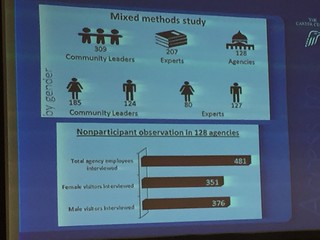
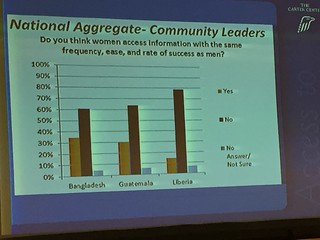
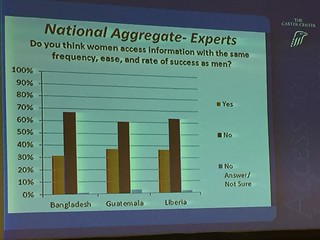
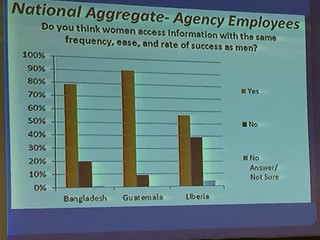
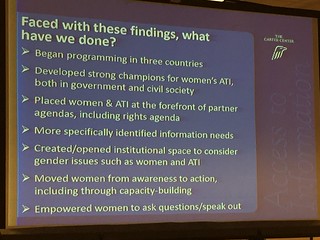
- Illiteracy
- Lack of awareness
- Fear of asking
- No time
- Not culturally appropriate
- Information is seen as not appropriate for women
What would help?
- Education
- Employment / right to work
- Business/trade
- Land / property
- Women's rights
The Carter Center is working to improve awareness and access. She spoke about Liberia and Guatemala.
Do other marginalized persons face similar obstacles?
- Rural populations
- LGTBQI
- ...and others.
Challenges:
- Shifting political landscapes
- Heavily politicized context
- Deeply held social-cultural beliefs
- There is no existing model for doing this work
- Very little empirical data
- Poor infrastructure
- Difficult security environment
- Information is not a magic bullet
Lessons learned:
- Age should not be overlooked as a variable that impacts women's ATI
- Some obstacles vary by country
- Change takes time
- Everyone needs gender sensitization
- New frontier issues:
- Open data versus access to information
- Sustainable development goals
- Closing space
- Naitional security
- Privacy versus openness
- Wikileaks
- Political leaders
Thoughts for consideration:
- Who are you not reaching?
- How can you support women and marginalized persons to access information for more meaningful engagement?
- What can you do to bridge the gaps?
1 comment:
Dear Jill. It was great meeting you at ALISE. I was preparing my SU application and got diverted to your wonderful website and blogs while looking for some faculty information on iSchool website. This post particularly caught my attention as I attended this session at #ALISE17. I am not sure about other countries, but I totally disagree with the speaker of this session about the comments she made about Bangladesh. Since I am from Bangladesh I must say my knowledge about Bangladesh is superior to that of the speaker. I must mention that I am one of the many disappointed listeners of the #ALISE17 keynote session. I spoke with fellow scholars, research at the conference and many expressed very strong thoughts about the research findings of this session's speaker. The research findings were over-generalized and had been inaccurately used to label the countries. The data sources were unknown from this research. What was the population, timeframe, geolocation, cultural background, socio-political factors etc. - all were unknown, too! Women in Bangladesh expereince better lifestyle than that many of the developed countries. One unique example that I must bring here that we have female Prime-Ministers, the most powerful position of the country, from 1991 until today. Although all-gender quality-education has been a nationwide challenge, women in Bangladesh are continually becoming interested in education. This change is helping in many ways to improve socio-economical situations. Of course, there are many challenges that hinder the progress of the country overall. But, the rise of the women power in every sector of life in Bangladesh is really fascinating. I must confess the situation is not at its best, but we are proud how women are taking leading roles in many aspects of life in Bangladesh. Access to education and open society is key to making the ultimate challenge. I am sure and proud of women in Bangladesh and they will be contributing continually to develop a better society. While promises are looming, an inaccurate representation of a country in a scholarly platform (#alise17) is quite frustrating. Also, the fact that over-generalization is dangerous in research must be carefully considered for this case. --- I have so many things to complain about the keynote speaker's session just like many other baffled attendees of that session, but stopping here to get back to my work...submit the application. Again, it was wonderful to meet a pure soul like you at #ALISE17! Bests.
Post a Comment